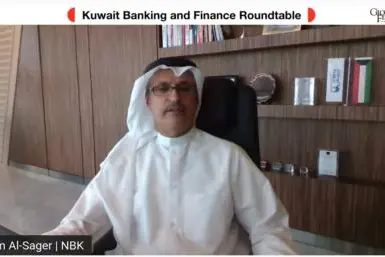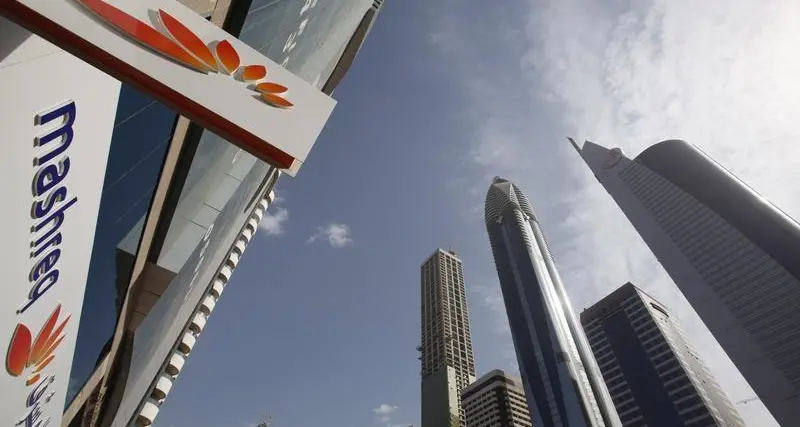PHOTO
- The Central Bank’s efforts over the past decade, building one of the region’s strongest banking systems is allowing banks today to play a key role in economic recovery in Kuwait
- The rebound in government spending will support the growth of non-oil GDP, improve economic diversification and future job creation
- A post-COVID world will offer opportunities for cross-border mergers and acquisitions
- International rating agencies will soon include ESG reporting and scoring into their credit rating criteria
Mr. Isam Al-Sager, the Group CEO of National Bank of Kuwait (NBK) stated that although negatively impacted as a result of the lower interest rate environment, the lower business volumes and the higher provisions that were mainly precautionary in nature in anticipation for the pandemic’s fallout, Kuwaiti banks remained very solid demonstrating ample liquidity, strong capitalization and stable asset quality trends.
During the virtual roundtable organized by Global Finance under the theme “Banking and Finance”, Al-Sager said: “Thanks to the efforts of the Central Bank over the past decade, building one of the strongest banking systems in the region, banks can be part of the recovery of economic activity in Kuwait. The solid position that the banking sector enjoys today will be a key enabler to support a macro recovery once the virus is controlled.”
We are optimistic with the efforts carried by the government to control the spread of the virus and to accelerate the vaccination of the population in order to bring life back to normal, he mentioned.
The imminent economic recovery will reflect positively on some sectors allowing them to be early beneficiaries like consumer, retail, travel and aviation, while others will lag but with limited permanent damage in the future, Al-Sager highlighted.
Al-Sager indicated that recent GDP data are showing some recovery compared to previous quarters, and we are expecting 2021 GDP growth to reach around 3%, noting that a rebound in government spending on infrastructure projects can also lead to a pickup in non-oil GDP growth and improve economic diversification, in addition to creating opportunities for the private sector.
The future of consolidations
On the impact of COVID-19 pandemic on the future of consolidations at the country and regional level, Al-Sager mentioned that the pandemic has led to extreme instability in markets as it disrupted the global business trends and reshaped many industries.
Al-Sager explained that the disruption caused by the pandemic has also affected the banking sector across various geographies and its protracted consequences will remain felt in the future as recovery takes place gradually, noting that the post-COVID world will offer opportunities for cross-border mergers and acquisitions as various financial institutions will face challenges to remain operational while others strive to become larger and more diversified to withstand regional and global competition.
Cross-border consolidation can also create many synergies allowing for cross selling in different markets, cost savings, transfer of knowledge, technology and talent, he added.
Al-Sager indicated that higher compliance costs associated with the increase requirements are also adding to the costs for banks, compounding pressure on small and medium-sized lenders to consolidate, referring to the estimates that more than twenty Gulf financial institutions with total assets exceeding USD1 trillion were in merger talks in 2020.
Banks in KSA, UAE and Qatar are merging to create larger financial institutions to support the transformational efforts that are underway in their relevant economies, he added.
Al-Sager stressed that Kuwaiti banks need to be well-prepared and positioned to leverage any emerging opportunities and remain competitive on the regional front.
Faster and more sustainable recovery
Speaking on the new prominence of Environmental, Social and Governance (ESG) considerations during the pandemic, Al-Sager mentioned that companies’ embracement of ESG will undoubtedly lead to a faster and more sustainable recovery.
ESG disclosures and transparency help mainly in building public trust and enable all stakeholders to make a better-informed decision, he noted.
Al-Sager highlighted the growing importance of ESG practices and reporting, thanks to the growing demand for sustainable investments globally, with more investors focusing on ESG investing.
Additionally, premium valuations and pricing are being paid for companies with a strong ESG program and satisfactory reporting, Al-Sager added, noting that all NBK’s recent bond issuances, and its discussions with investors in the process of promotion of these issuances, reflected their increased focus on ESG practices and disclosures.
Al-Sager mentioned that in 2020, ESG funds captured USD 51 billion in net money from investors compared to USD 21 billion in 2019, whereas more than USD 30 trillion of sustainable assets are professionally managed globally.
ESG disclosures have recently been evolving from an optional, best-practice concept into a prerequisite and a reporting requirement by various industry practiosioners. Most recently, we have seen various initiatives and proposals by the likes of ESFS (European System of Financial Supervision) and IFRS Foundation (International Financial Reporting Standard) all aiming to improve ESG transparency through a standardized set of sustainable reporting standards, he added.
Al-Sager saw that, very soon, all rating agencies will include ESG reporting and scoring into their rating criteria, creating a framework where ESG practices can have a direct impact on credit ratings.
In Kuwait, we have seen significant developments taking place on the Governance front thanks to the CBK’s efforts in developing and advancing the framework in the banking sector, he added, noting that the recent appointment of independent board members in banks is a great example of these ongoing developments.
Al-Sager concluded that many initiatives were introduced by Boursa Kuwait to promote sustainability reporting by listed companies and potential plans to establish an ESG index to further stimulate ESG disclosures, emphasizing that there is more to be done to accelerate the trend through more country-wide efforts to prepare Kuwait companies to the upcoming changes in the regulations and reporting standards that are focused on ESG.
-Ends-
© Press Release 2021
Disclaimer: The contents of this press release was provided from an external third party provider. This website is not responsible for, and does not control, such external content. This content is provided on an “as is” and “as available” basis and has not been edited in any way. Neither this website nor our affiliates guarantee the accuracy of or endorse the views or opinions expressed in this press release.
The press release is provided for informational purposes only. The content does not provide tax, legal or investment advice or opinion regarding the suitability, value or profitability of any particular security, portfolio or investment strategy. Neither this website nor our affiliates shall be liable for any errors or inaccuracies in the content, or for any actions taken by you in reliance thereon. You expressly agree that your use of the information within this article is at your sole risk.
To the fullest extent permitted by applicable law, this website, its parent company, its subsidiaries, its affiliates and the respective shareholders, directors, officers, employees, agents, advertisers, content providers and licensors will not be liable (jointly or severally) to you for any direct, indirect, consequential, special, incidental, punitive or exemplary damages, including without limitation, lost profits, lost savings and lost revenues, whether in negligence, tort, contract or any other theory of liability, even if the parties have been advised of the possibility or could have foreseen any such damages.



















